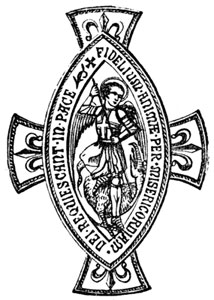Perfect in the Day of Christ  The Sermon Preached at St. Cuthbert's, ON THE
BY THE
LONDON: |
Perfect in the Day of Christ  The Sermon Preached at St. Cuthbert's, ON THE
BY THE
LONDON: |
“Waiting for the revelation of our Lord Jesus Christ, Who shall also confirm you unto the end, that ye may be blameless in the day of our Lord Jesus Christ.”—1 Cor. i. 7, 8.
HUMAN life is divided into two parts—life in time and life in eternity. According to common notions the dividing line between these is death. Thus the saintly life is thought of under one of two aspects, either as (1) in this world in trial and suffering, or (2) in the state of perfect glory and bliss, which very many Christians believe the faithful departed attain immediately after death. This notion plainly contradicts the doctrines of Resurrection and Final Judgment which we confess in the Catholic creeds; and it takes away the force and practical meaning of that very solemn but most comforting article in the Apostles’ Creed of the Lord’s descent into Hades. But in Holy Scripture we are taught that time does not end at death: it goes on till the Judgment Day. That is the end for which we are taught to look: it is for the revelation of Jesus Christ that we are to wait and to prepare. Thus St. Paul prays for the Philippian converts that they “may be sincere and without offence till the day of Christ.” He is confident that God Who began a good work in them “will perfect it until the day of Christ.” And that this teaching does not depend on the belief in the speedy return of the Lord is plain from the Apostle’s words just before his death—“I am already being offered, and the time of my departure is come. . . Henceforth there is laid up for me the crown of righteousness which the Lord, the Righteous Judge, shall give me”—not when I die, but—“at that Day.” And thus, too, he prays for his friend Onesiphorus, who had probably departed this life—“The Lord grant unto him that he may obtain mercy of the Lord in that Day.” May it not be possible that the doctrine of the particular judgment of a soul at death has [2/3] been too much pressed by modern theologians, Roman and Anglican, so as to have overshadowed the sense of reality of the final Judgment and the importance of the intermediate state?